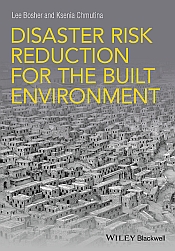Water Engineering
Hazards, Risk and Resilience
We undertake mixed methods and multi-hazards research into how a sustainable and resilient built environment can be best achieved, especially in low- and middle-income countries.

HAZARDS RISK AND RESILIENCE
ON THIS PAGE: EXPERTISE | RESEARCH | PUBLICATIONS | STAFF
Expertise
We have expertise in:
- Blue Green Infrastructure
- Catchment and flood modelling
- Co-design of solutions with local stakeholders
- Disaster risk analysis and management
- Resilient and sustainable urbanism
Research
We work internationally on a diverse suite of projects that are oriented towards disaster risk management, sustainable infrastructure and stakeholder participation. Recent projects include:
- BuGIS (Indonesia) – This Newton Fund project (£92k) to increase the flood resilience of Semarang City by integrating Blue Green Infrastructure (BGI) into urban development planning.
- Building Resilience (Nepal) – This GCRF Frontiers of Engineering for Development Seed funded project aimed to better understand the effectiveness of advice for increasing resilience of buildings and to improve knowledge exchange with informal construction stakeholders in Nepal.
- ValBGI (Vietnam) – On this NERC funded project (£185k) we are working closely with stakeholders to co-develop an innovative modelling, assessment and valuation framework to examine the role of BGI in urban development. Through this work we will identify urban planning strategies that simultaneously promote flood resilience and investment into urban natural capital through the use of natural processes-based blue/green design options.
- River basins as ‘living laboratories’ for achieving sustainable development goals across national and sub-national scales (China) – Using the Luanhe river basin as a case study, this NERC funded project (£130k) is quantifying basin hydrology, sediment transport, and ecosystem services under various scenarios of basin development and land use change, with the ultimate aim of assessing how changes in these relate to various interlinked Sustainable Development Goal targets.
- Evaluating the resilience of critical infrastructure for emergency response to extreme flood events in Leicester City (UK) – For this NERC funded project (£82k) we worked with local city-level stakeholders to convert academic research/knowledge into usable information and tools for the local resilience forum.
Publications
Selected Recent Publications
- BOSHER, L., CHMUTINA, K. and VAN NIEKERK, D. 2021. Stop going around in circles: towards a reconceptualisation of disaster risk management phases, Disaster Prevention and Management, Vol. ahead-of-print No. ahead-of-print.
- BOSHER L., KIM, D., OKUBO, T., CHMUTINA, K. and JIGYASU, R. 2019. Dealing with multiple hazards and threats on cultural heritage sites: an assessment of 80 case studies, Disaster Prevention and Management, DOI: 10.1108/DPM-08-2018-0245
- CHEEK, W. and CHMUTINA, K. 2021. `Building Back Better' is Neoliberal Post-Disaster Reconstruction, Disasters, https://doi.org/10.1111/disa.12502
- CHMUTINA, K., SADLER, N., VON MEDING, J. and ABUKHALF, A.H.I. 2020. Lost (and Found?) in Translation: Key Terminology in Disaster Studies, Disaster Prevention and Management, 30(2), 149-162.
- MING, X., LIANG, Q., XIA, X., LI, D. and FOWLER, H. J. 2020. Real-time flood forecasting based on a high-performance 2D hydrodynamic model and numerical weather predictions, Water Resources Research, 56(7), e2019WR025583.
 |
Lee Bosher and Ksenia Chmutina have authored textbook on Disaster Risk Reduction for the Built Environment that provides a multi-facetted introduction to how a wide range of risk reduction options can be mainstreamed into formal and informal construction decision making processes. This highly-illustrated textbook highlights the positive roles that practitioners such as civil and structural engineers, urban planners and designers, and architects (to name just a few) can undertake to ensure that disaster risk is addressed when (re)developing the built environment. |
Staff with research activity in this area


